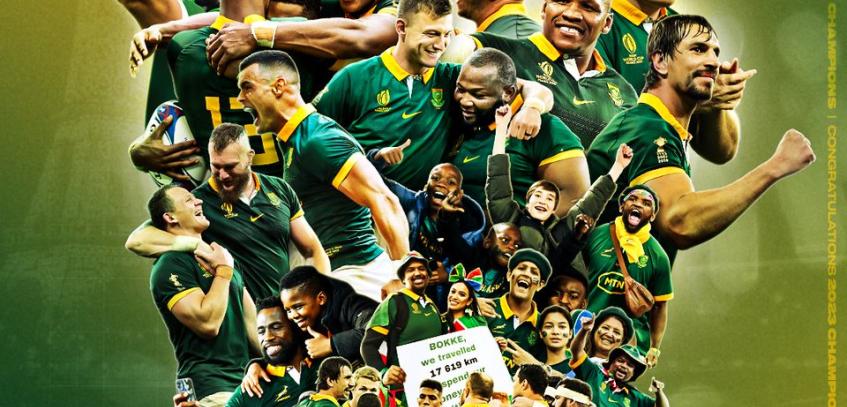South Africa’s Rugby men’s team nicknamed the “Springboks” have become the first team in the history of the sport to win four World Cups after they narrowly edged New Zealand 12-11 in the final of the 2023 Rugby World Cup at the Stade de France.
The “Springboks” headed to France as defending champions, having won the planetary tournament in 2019, nursing the ambitions of making it to four World Cup crowns, having won previous editions in 1995 and 2007. The final against New Zealand was a replay of the 1995 edition where both teams faced off for the coveted trophy. Buoyed by an energetic home crowd and fired by an insatiable quest to reach the firmament of the sport, the host South Africa overpowered New Zealand 15-12 at extra time to keep the trophy home.
28 years later, the scenario looked identical. New Zealand’s only loss at a final in the World Cup had been against South Africa. The “Springboks” had emerged from a group considered the most difficult in the tournament, competing alongside the world’s best- ranked team Ireland, and Scotland who was fifth on the global pecking order. New Zealand had to contend with the host France ranked third globally and Italy 13th on world rankings. Both teams had qualified for the next hurdle after finishing second in their respective groups.
Their runs to the final had been spectacular with the South Africans defeating the host France in the quarterfinals while the “All Blacks” as New Zealand’s team is referred to brought an abrupt end to Ireland’s journey in the competition. The flamboyance exhibited by the Springboks and the All Blacks laid the foundations for an exciting final.
The Springboks captained by the inspirational Siya Kolisi showed a true blend of individual brilliance and team effort battling against New Zealand, demonstrating incredible fighting spirit and absolute determination to write their names in the annals of Rubgy as the first nation to bag home the Webb Ellis cup as the event’s trophy is referred to four times.
At full-time, South Africa’s win in France reverberated in Africa with millions of fans across the continent taking to social media to congratulate the Springboks for their history-defining exploit. Over in the Southern tip of Africa, there were celebrations just like in most parts of the continent where it became evident that South Africa’s achievement meant they were now the best rugby nation on earth.
Scores of influential figures across the continent acknowledged South Africa’s victory with the Chairperson of the African Union Commission Moussa Faki Mahamat describing
the Springbok's triumph as “a powerful testament to a team that has shown the world time and time again, how to be stronger together” before saluting the world champions.
South Africa’s World Cup victory has ushered in renewed hopes for African nations across different sports to strive for excellence for a prosperous continent. This hope is aligned with the African Union’s “Agenda 2063” which aims at thriving inclusive and sustainable development as well as fostering pan-African ideals such as unity, self- determination, freedom, progress, and collective prosperity to transform the continent into a global powerhouse.









